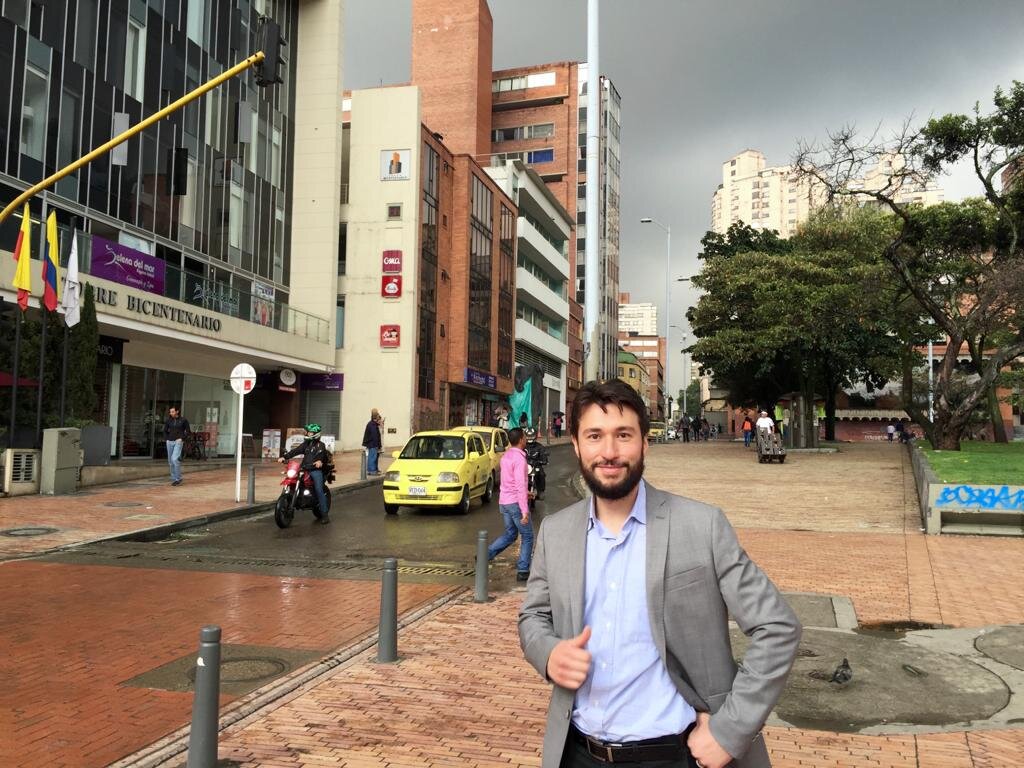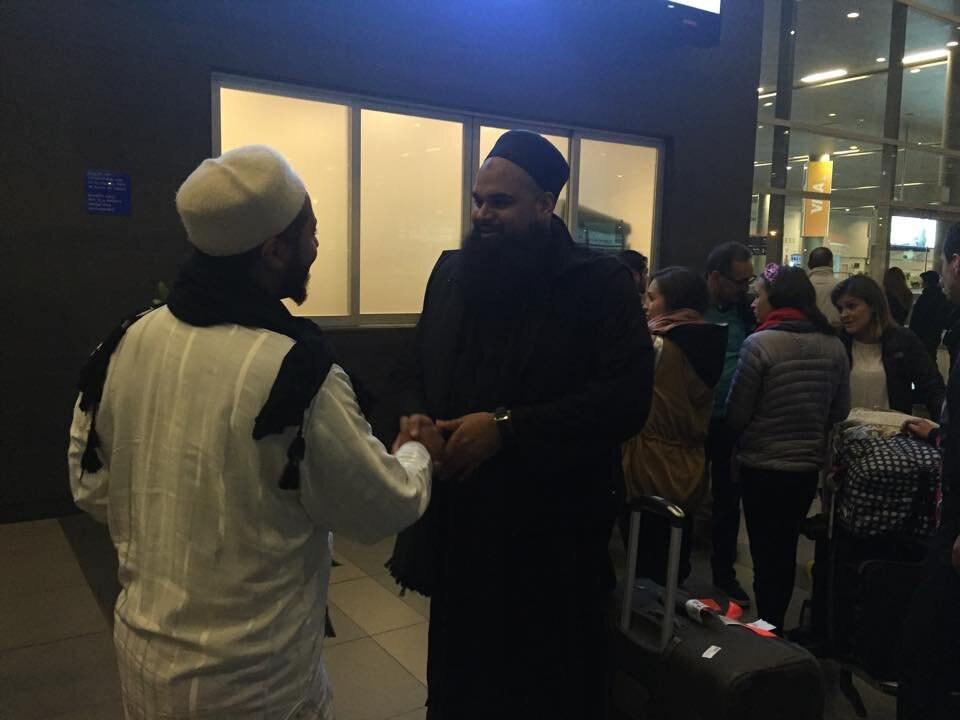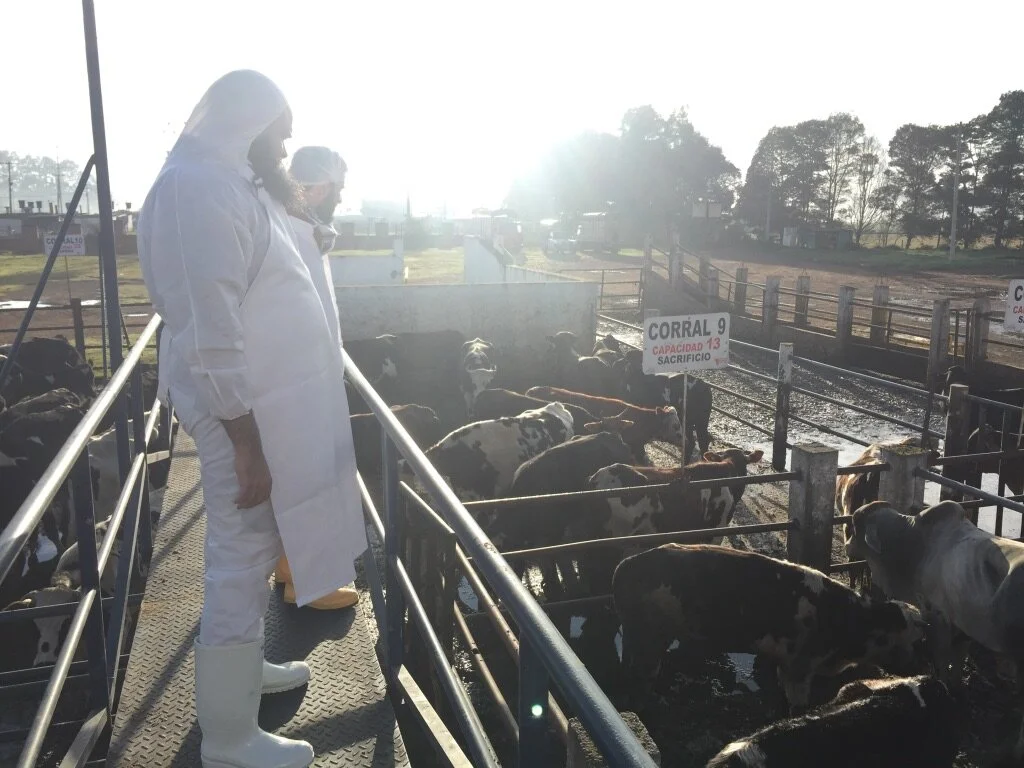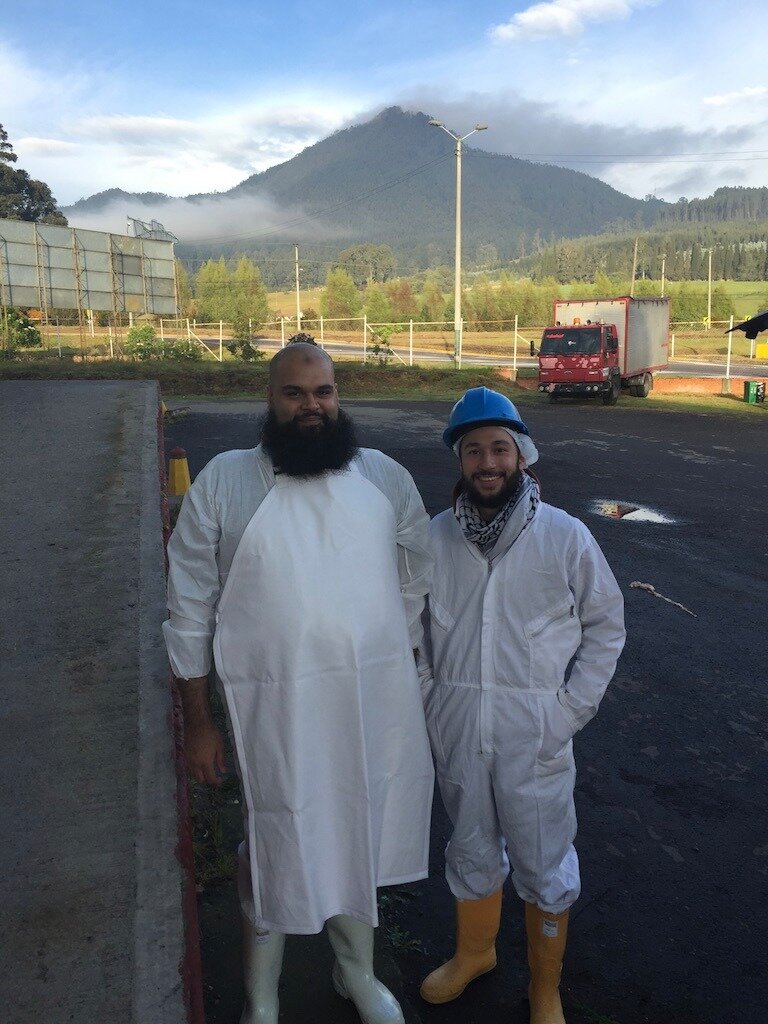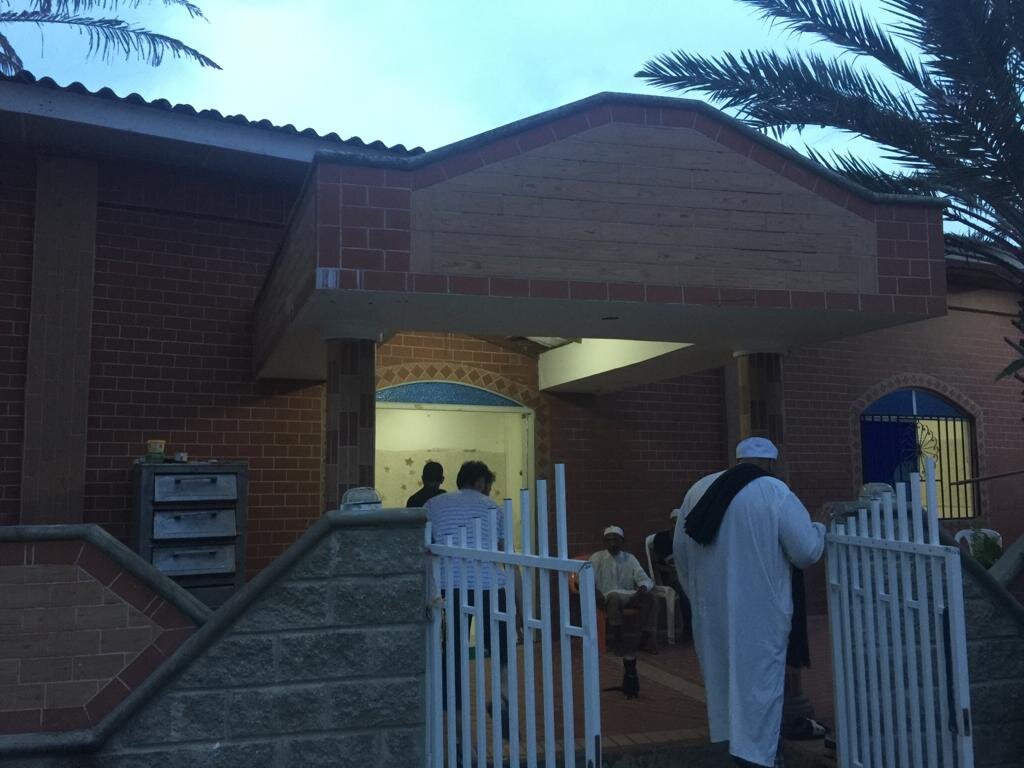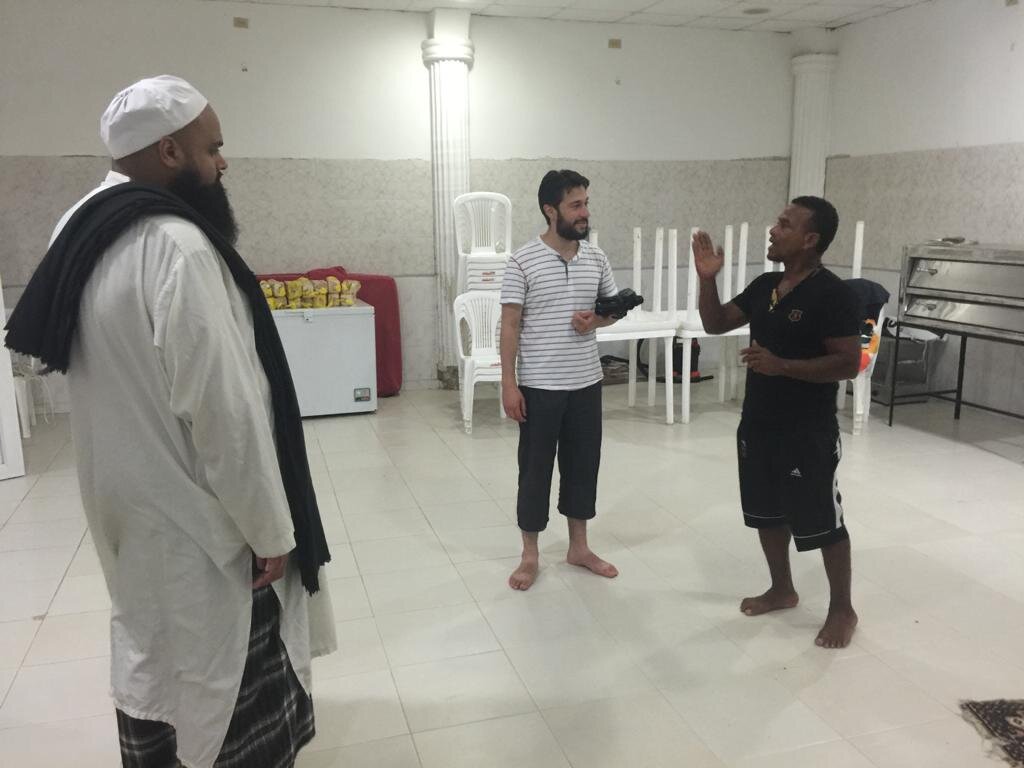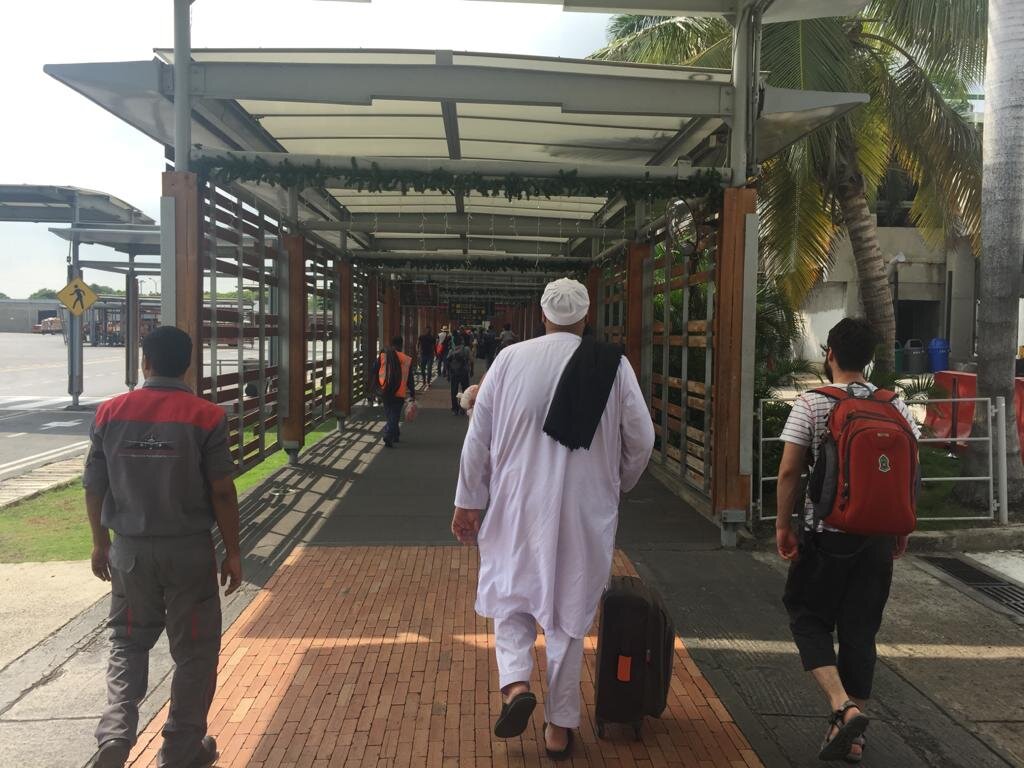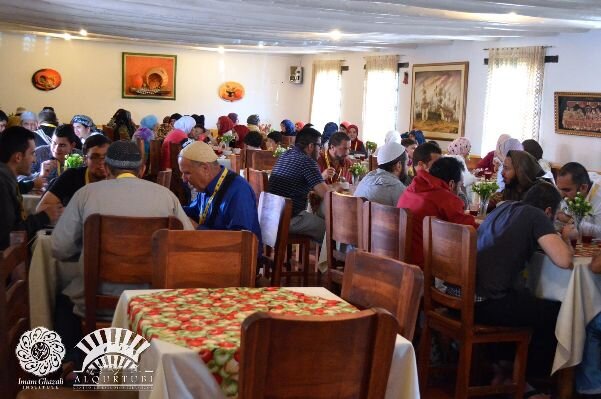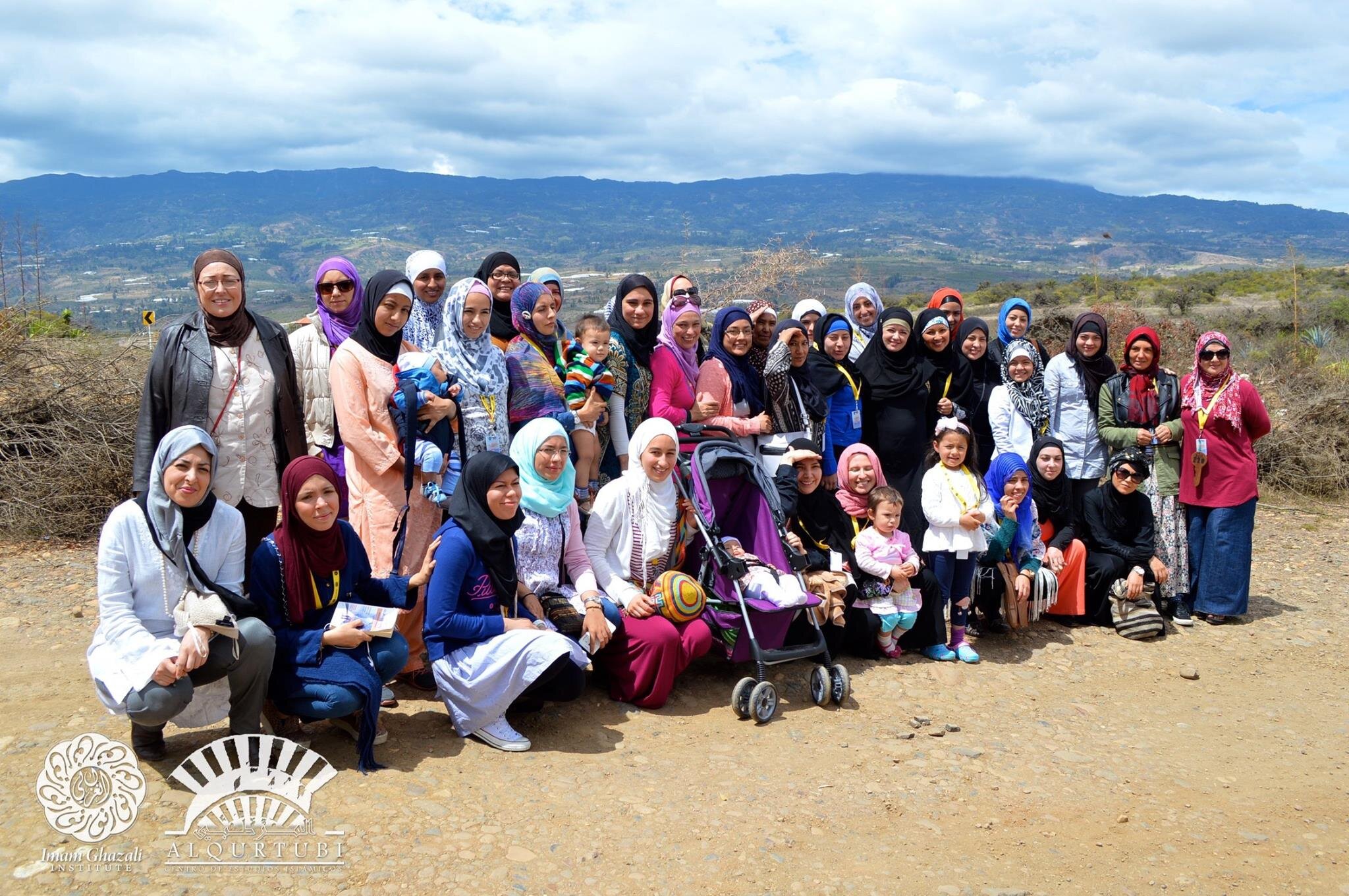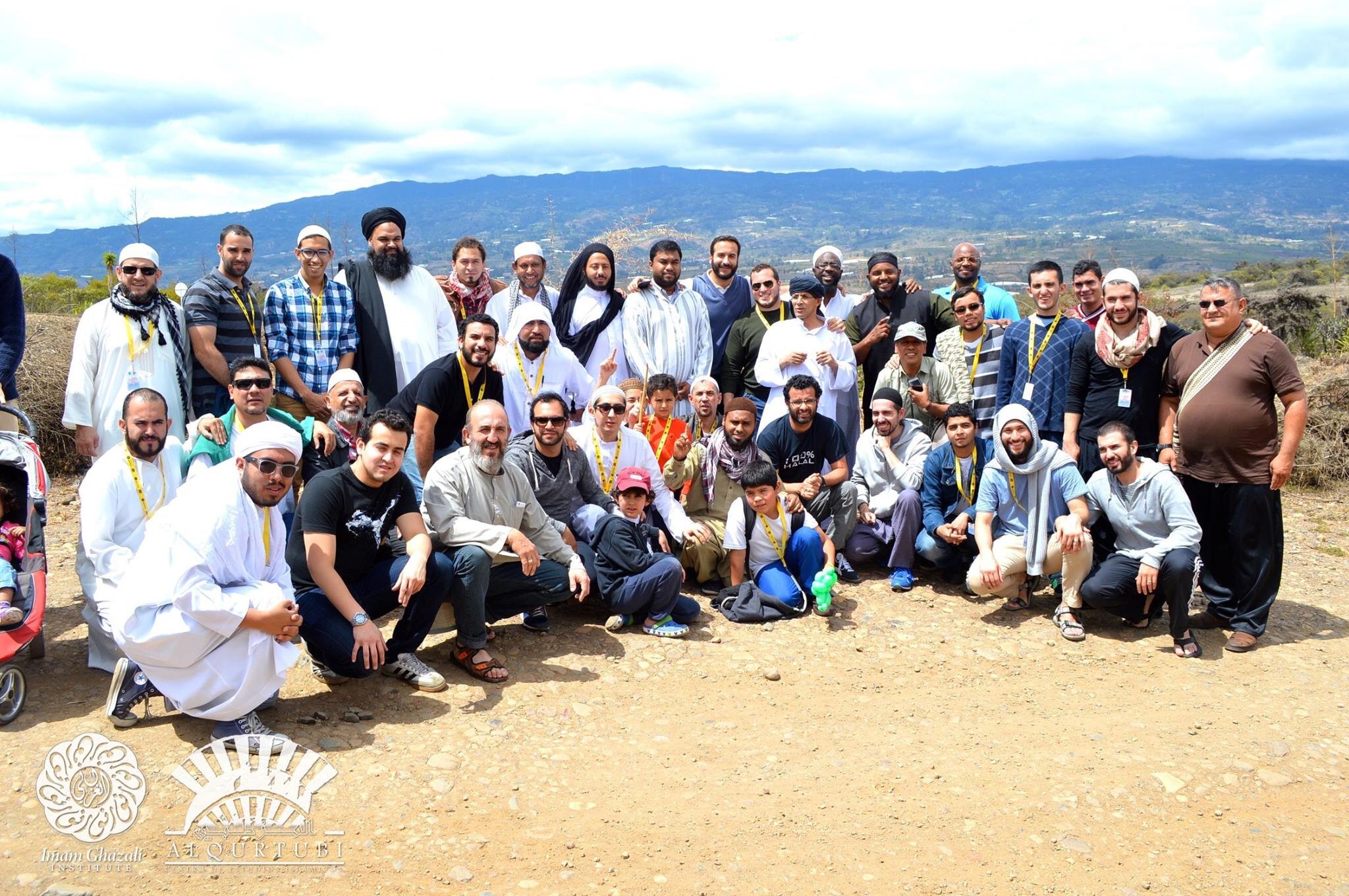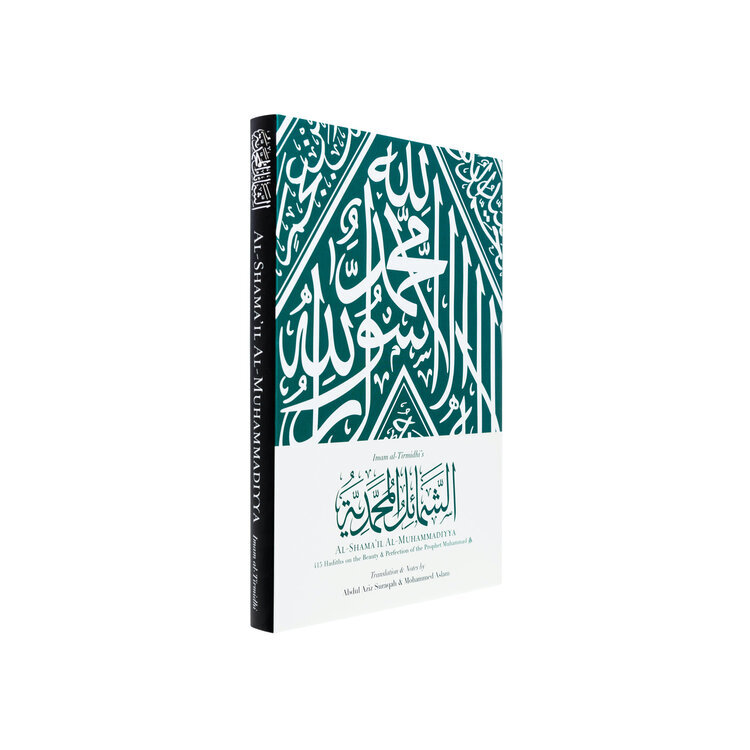This article is about IGI's first trip to Latin America, chronicled by our Executive Director, Muhammad Sattaur.
Bogotá, Colombia - July 2015
On the evening of the 29th of Ramadan, 2015, a little-known group of Muslims near Bogota, Colombia sighted the crescent moon. As it happened, they were amongst the first Muslims anywhere in the Western Hemisphere to sight the moon on that night.
Around the world, many Muslims were already planning to celebrate Eid the next day, according to calculation and international sightings. Others were awaiting a verified sighting of the hilal. Thanks to the small group in Colombia, many Muslims throughout the Americas and beyond celebrated Eid together.
In the words of my dear teacher Shaykh Hamzah Maqbul, these Colombian Muslims had “saved Eid.”
I was intrigued.
I wanted to learn more about them.
It turned out their masjid was called Al-Qurtubi Center. I found their Facebook page and sent them a message.
Within minutes, someone replied.
South American Origins
l have always wanted to work with Muslims in South America.
My own family is originally from Guyana, which borders Venezuela, Brazil, and Suriname, and has a coastline on the Atlantic Ocean, just beyond the easternmost reaches of the Caribbean Sea in the northern part of South America. Previously known as British Guiana, Guyana is the only English-speaking country on the continent. Naturally, I feel a strong connection and brotherhood with our Muslim Spanish & Portuguese-speaking neighbors.
My family moved to New York City when I was young, and I benefited from the growing abundance of Islamic knowledge now accessible in the English-speaking world. Yet when I looked back to South America, I was struck by the lack of resources for Spanish-speaking Muslims. Even basic texts were often unavailable, or if they were, they were usually poor quality and sometimes inaccurate.
So, when I reached out to Al-Qurtubi Center in Bogotá, I didn’t know what to expect.
Clearly, they were Muslims who practiced the sunnah of moonsighting. In our age, that alone is somewhat uncommon and noteworthy.
I wondered what they might need, and whether IGI might be able to assist them.
I would soon find out.
I received a reply to my Facebook message, from one of the founders of the Qurtubi Center, Victor Suarez. He spoke simultaneously on behalf of Shaykh Ilyas Marzougui, the Imam of the community.
Shaykh Ilyas of the Al-Qurtubi Center
Born in France to Tunisian parents, Shaykh Ilyas studied in Damascus, then moved to Colombia with his wife, where he helped establish Al-Qurtubi Center in the city of Bogotá
Victor and Shaykh Ilyas
After exchanging messages for a bit, Victor, Shaykh Ilyas, and I had a phone call.
As I said, I didn’t know what to expect.
It turned out Shaykh Ilyas was born in France, and his family was of Tunisian origin. He had attended Abi Nour Institute in Damascus, and it was there that he met his wife, a Muslim woman from Colombia. Upon graduation, they moved to her home country in Columbia together.
I don’t know what Shaykh Ilyas expected of me, either, but once we got on the phone we hit it off. Eventually, we started talking about opportunities to assist the Muslims of Bogotá. I proposed the idea of a weekend intensive, based on the programs that Imam Ghazali Institute had organized in various cities around North America and Europe.
“I’m not sure,” Victor said. “You know, the people here, they've never done that type of event before.” He sounded very certain, and perhaps a bit worried.
I asked Shaykh Ilyas to explain.
“If we were to organize an intensive, even if it was a one day intensive, maybe no one would come. Culturally, they're just not used to that.”
As it turned out, he was absolutely right.
Shaykh Ilyas Marzagoui at IGI's 2015 retreat
To encourage attendance, IGI and Al-Qurtubi Center worked together to hold a different kind of retreat
Adapting to Cultural Differences
We’ve seen this everywhere we’ve been in Latin America and the Caribbean, from Trinidad to Mexico. The idea of committing to a 3-day weekend intensive is a very strange and difficult thing for people in those regions.
In America, it’s common for seekers of Islamic knowledge to attend weekend intensives. But in Latin America, this format is unknown.
As Victor and Shaykh Ilyas explained the issue, I had an idea.
“Why don't we reformat it?”
Victor asked what I had in mind.
I continued: “Let’s do a three day intensive, but we'll only make it four to five hours per day actually learning."
Almost simultaneously, Victor said, "And, we'll do it as a retreat format, so it will be like a vacation for everyone. So, you know, people will see it as a vacation, and some sort of educational initiative.”
Classes at the villa
People listen attentively during Shaykh Hamzah's class at the Qurtubi Center weekend retreat
A Weekend Intensive in Disguise
After some discussion, we decided to rent a vacation villa for the weekend.
We found a villa with room for about 80 people, which would be about two full buses. We would aim to bring about 40 men and 40 women. Attendees would pay a symbolic fee, not so much to cover costs, but more to signify commitment, that they had paid for something.
IGI was able to cover much of the cost of the villa and the program.
One interesting thing about that trip was that, at the time, there were no halal restaurants in Bogotá.
However, thanks to Shaykh Hamzah Maqbul, we ate delicious, fresh burgers every day.
Halal Burgers for Everyone
Today, most Muslims in the US, Canada, and the UK live within a reasonable distance of a store that sells halal meat.
Most major cities have at least one halal butcher shop. Many grocery stores carry an increasing variety of halal products. Some halal brands, like Saffron Road in the US, have achieved crossover appeal in mainstream natural foods stores.
We pay close attention to labels, and perhaps drive out of our way to go to certain shops, but overall eating halal foods is becoming relatively convenient.
This was not always the case.
Our elder generation remembers a time when, if you wanted halal meat, you had to process the animals yourself.
When I went to Colombia (and many other countries in Latin America) that's exactly how it was.
At the time, Al-Qurtubi Center community would process cattle and chicken about once per month, and the meat was distributed amongst all the Muslim families in the Bogotá region who requested it. When we visited, they did only one cow each time. The community has grown since then, and today they might easily process 2 or 3 animals per month or more.
In planning the retreat - the vacation getaway/Islamic weekend intensive in disguise - we told Shaykh Ilyas that we wanted to feed everyone very well. We wanted to have fresh halal burgers for everyone each day.
Victor came forward for this honorable task.
Victor, the president of Al-Qurtubi Center, in downtown Bogotá
One of the founders of Al-Qurtubi Center, Victor was our guide & translator for the duration of our first trip through Colombia
Providing Zabihah For The Community
Victor grew up in Colombia, went to school in the US, and converted to Islam while in his 20s. He met his wife, who was raised as a Muslim in America, a few years later, and they moved to Bogotá together.
When we met him, Victor worked for an American company.
He was also the Al-Qurtubi Center President-servant-community leader-part time butcher.
A Shared Commitment To Halal
The biggest reason Shaykh Hamzah came on the trip was actually his commitment to zabihah halal foods.
When we first started planning the trip to Colombia, I asked Shaykh Ilyas if the Qurtubi Center community would like us to bring a speaker from the USA. They said yes, so I shared some YouTube videos of teachers who might be able to make the trip.
These days, Shaykh Hamzah has his own YouTube channel, but at that time most of his online talks were posted on other channels. The video I shared was a workshop from 2012 titled "Halal Matters: Clarity Amidst Controversy" in which Shaykh Hamzah discusses the state of the halal meat industry.
Shaykh Ilyas & the Qurtubi Center community were impressed by Shaykh Hamzah's commitment to zabihah halal standards, and that's largely why they asked if he might be able to come to teach them more.
"They won't disrespect a person of God"
Shaykh Hamzah Maqbul has a great memory.
When we spoke about our 2015 trip to Colombia, he remembered lots of details, many of which I had forgotten.
When I asked if he would come to Colombia, South America with me, he didn't hesitate.
"Absolutely, I'm down. Let's do it."
A few weeks later, we arrived at the airport in Bogotá, not sure what to expect, or who we would meet there. At customs, interestingly enough, no one gave Shaykh Hamzah a hard time. Dressed as he was, in robes & turban, we expected some hassles, but instead, they just let him through.
In our recent conversation, he mused, "I think that happened three times in Colombia. Each time, I had the same experience. Nobody treated me in any way other than respectfully."
I, dressed in jeans & shirt, was pulled aside for secondary questioning.
A few brothers from the Qurtubi Center met us in the Bogotá airport. Shaykh Hamzah reminded me of how they met us with so much happiness. They actually gave him a bouquet of flowers!
They asked about our trip:
"Did they give you a hard time in customs?"
Shaykh Hamzah replied, "No, actually, I was really surprised - you know, for being such a strange-looking person, as I am. They kind of let me slide right through.'"
Their explanation was amazing:
"It's not that they didn't notice you. And it's not that they didn't want to question you. But there's something about the people of this land, they don't have it in them to disrespect a person of God.'"
A warm welcome
Shaykh Ilyas (left) greets Shaykh Hamzah (right) at Bogotá International Airport
Working to obtain Halal Foods
A few days after we arrived in Bogotá, Shaykh Hamzah Maqbul & I met Victor immediately after fajr. The slaughterhouse was nearly 2 hours away, and we had to be there an hour before it opened.
The mere fact it was so far away showed this community's dedication.
On the way there, I asked Shaykh Hamzah to share his thoughts on eating halal, and the answer was both profound and life-changing:
"To others, it is an afterthought," said Shaykh Hamzah. "A dedicated bone of an issue, irrelevant and burdensome. To me it is Dīn. Yet, as a matter of belief you are what you eat. Don't front as if you are standing for justice and progress, while you stuff your face with a corporate mockery of the Dīn."
I was shaken to my core.
Shaykh Hamzah continued, "If you eat clean, you will be clean. If you eat with Taqwā, only then will you fear Allāh in your worship and activism. Allāh is pure and only accepts that which is pure."
The issue of Halal and Haram clearly deserves a seminar.
Shaykh Hamzah surveys the cattle at the processing facility
The Slaughterhouse
Despite only four hours of sleep, Shaykh Hamzah was happy to go. He also didn't want to disappoint our hosts - they knew he was an expert in halal processing, and had asked him to review their processes and show them how they might improve and do things properly.
It turned out to be a beautiful drive, several hours outside the city. When we arrived, we suited up into industrial slaughterhouse gear, and went inside.
Admittedly, as we arrived I was fascinated. This was my first time experiencing a slaughterhouse.
Victor had a good relationship with the operators of the facility, and they made special accommodations for him. Victor would process animals first thing in the morning, when the facility was still completely clean & sanitized from the night before, thus avoiding cross-contamination with non-halal meats.
Shaykh Hamzah and I were impressed. The slaughterhouse processed hundreds of animals each day. In terms of business, the Al-Qurtubi Center community were insignificant, yet the facility operators went above and beyond to help them obtain halal meat.
"People actually listen"
Shaykh Hamzah slaughtered a head of cattle and also inspected the plant, to review their halal practices, as he had done many inspections with Halal Advocates.
He remarked on how receptive the Colombian brothers were to advice:
"That was the first of many times in Colombia where I felt something strange, which is that when we talk about deen to somebody, they would actually listen. And there we are in an industrial slaughterhouse - and generally, a person is not keen to go and do the work of a butcher, you know? But I was like, wow, man! These people, they actually took what we said to heart, and they're trying their best to put it into practice, and they want to learn!"
We processed two cows. Then, we cleaned up & began the two-hour drive back to Bogotá.
Shaykh Hamzah & Victor outside the slaughterhouse
Before entering the processing facility, we dressed in full sanitary & safety gear.
The facility operators were extremely respectful of Victor, and went above and beyond to accommodate our needs to fulfill the standards of halal processing
A secret to a strong community
Shaykh Hamzah believes that the shared commitment to eating halal was one of the things that keeps the Qurtubi Center community together.
"They wanted to make sure everything was that was eating that that weekend at the retreat was halal, so that there could be baraka in it. And they were very eager to learn from me. Sometimes as an imam, you get frustrated, because it feels like nobody cares. And then, lo and behold, you say something to someone for the sake of Allah, and they actually go with it!"
At the Qurtubi Center itself, they actually have a fridge inside the masjid where the halal meat is stored. About once per month, someone will go slaughter, and then they will get the custom the packages made, and store them in the in the center, and people pick them up from there.
After the slaughterhouse, our next engagement was a talk on Thursday night, then jumu'ah khutbah at the Qurtubi Center.
Shaykh Hamzah recalled that the community was very attentive during his khutbah:
"The khutbah was given half an Arabic and half an English, and Shaykh Ilyas stayed and translated after it was done. And everyone stayed, which is interesting because Friday is not a day off for them. But people stayed and listened to the translations, and then we had a meal with all of them. It was very beautiful, masha'Allah, a very beautiful gathering."
On Saturday, we traveled north.
This time, we went by plane.
We had planned an event in the city of Medellin - the land of the notorious cartel boss Pablo Escobar...
A sophisticated city with a difficult past
In much of the world, the city of Medellín brings to mind the notorious cartel boss Pablo Escobar, whose drug empire was based in the city until his death in a shootout in 1993.
But within Colombia, and throughout South America, the city of Medellín is far better known as a sophisticated hub of business & fashion. Many multinational companies have their Colombian headquarters in Medellín. The people of the city have a reputation for hard work & business acumen.
"Colombia is a really interesting place," Shaykh Hamzah commented. "I think in general it was a really cool place that I could really get along with."
"The people are very sophisticated, and in general the people - especially in Bogotá & Medellín - are very cosmopolitan, highly educated, sharply dressed, clean-cut. When we taught about Islam, they ask astute questions. It's strange because when Americans think about Colombia, we think about drug lords & Pablo Escobar. The reality is they're similar to people here in America, but they're not as arrogant.
"So, for example, if a person in Colombia asks you a question about deen, they'll try to understand your answer, but in general they won't try to fight against you.
"Whereas here in the US, it seems like people are always trying to prove how smart they are, by showing you how little they accept what you say."
People listen attentively during Shaykh Hamzah's class at Al-Qurtubi Center weekend retreat
Dealing with foreign ideologies
Shaykh Hamzah also commented on a pattern he saw with many converts we met at Al-Qurtubi Center & elsewhere in Colombia:
"Each family there has an extraordinary story, and Qurtubi was all of these people, who were attracted to Islam and who wanted to make good on it. Qurtubi serves those people.
"And Qurtubi especially serves people who have problems.
Outside the only masjid in Medellin (at the time)
There are about 100 Muslim families in a city of millions. Photo by Himy.
"We noticed a lot of people who had converted at one of the embassies, and who subsequently met people who tried to teach them a specific ideology, basically serving the foreign policy of some country or another. These converts would quickly become disillusioned & burned out from that ideology. Some converts would go through this 2 or 3 times, with different ideologies & sects.
"You know, it's hard enough to convert, right? And then, having to go through all that. And after several years of that, you have multiple layers of issues.
"Many people probably leave Islam after this experience. But many of them find Shaykh Ilyas & the Qurtubi Center. Helping people through that is very hard, uphill work. But, wherever there's great difficulty, there's great baraka."
Traces of al-Andalus
While we saw plenty of challenges in Colombia, we encountered many reasons for hope.
Sometimes these hopeful signs were hidden in places where few people would notice them.
But sometimes they were obvious for all to see.
For example, when Shaykh Hamzah and I arrived in Medellín, we noticed something extraordinary - something that most of the locals probably overlook: many of the city's landmarks bear names from Muslim Spain. Riding the subway, we noticed stops named Andalucía, Córdoba, Fátima. We also encountered neighborhoods named Granada, Rosales, & Sevilla.
Certainly, these names reflect the city's Spanish colonial history. But their origin is in Muslim Spain otherwise known as Al-Andalus.
Indeed, the Spanish colonization of the Americas is closely tied to the history of Muslim Spain. It is well known that Christopher Columbus first sailed to the Americas in the year 1492. It is less well known that Granada, the last Iberian city under Muslim governance, was conquered by the Spanish at the beginning of that year.
In the end - whether they planned to or not - the Spanish brought much of the influence of the Muslim civilization with them to the Americas.
Journey to a hidden place
After two days of teaching in Medellin's sole masjid, we traveled north again.
We soon arrived in the beautiful city of Cartagena, on the Caribbean coast. The walled city & fortress of Cartagena date to the 1530s and the city contains some of the oldest European architecture in the Americas.
Farther up the coast, we would visit a tiny fishing village, to meet a man whose conversion to Islam (and subsequent conversion of the entire village) was nothing short of miraculous.
As of 2015, there was actually no mosque in the city, so we continued to a small village about 45 minutes outside the city center. There, we met some beautiful people, and perhaps the most interesting person of our trip.
A beachfront mosque on the Caribbean
Cartagena is a port city, on the Caribbean Sea. The region is exactly what you'd imagine when you think of the Caribbean coast...idyllic beaches, palm trees, thatched huts, blue sky, clear blue water. This village was no exception.
There, on a perfect Caribbean beach, we found a mosque.
The mosque was actually the only permanent structure in the entire village. All the houses & other structures were traditional thatched huts or similar structures, many on stilts to protect them from flooding. The mosque, though, was built of cement, brick, & tile.
It was beautiful, perhaps not an architectural marvel, but a simple, beautiful structure that stood out among the rest of the buildings in the village.
The Caribbean Sea from the beach north of Cartagena
Our taxi drove along the beach for about 30 minutes to get to the village. Once we arrived, we had to walk along the beach to get to the mosque
The story of the beachfront mosque
Shaykh Hamzah, Victor, & I met the brother who had helped found this remarkable mosque. His name was Ibrahim.
Ibrahim related his story, and Victor translated for Sh Hamzah & I:
"In the early 1970's," he told us, "I was a communist, because I always have had caring & concern for the poor, and for those who couldn't help themselves. So at the time, communism was in fashion, and I thought communism was a good way of ensuring that the poor & helpless people are taken care of.
"Then, in 1978, I heard about the Iranian Revolution, and I read about it. It seemed to be that they also wanted to make a society that took care of those who couldn't take care of themselves. And I had very little knowledge about Islam at that point.
"But when I began reading about the Iranian Revolution, my interest was piqued about Islam."
As we talked earlier this week, Shaykh Hamzah added:
"It's worth noting that not everybody who was into communism in those days was anti-religion. It was marketed to a lot of people as something that's very compatible with religion, and then they got [hijacked] later on."
The village mosque near Cartagena
Shaykh Hamzah & Victor take their shoes off as they approach the entrance to the mosque
A community accepts Islam
"I knew there was a masjid in the city of Maicao. I called them up and said, 'I want to know about Islam.'
"They said, 'Why don't you come over, so we can talk about it?'"
Maicao is in northeast Colombia, about 450 km from Ibrahim's village, close to the border with Venezuela. In the 1970's, a number of traders from Syria & the Levant had developed businesses in Maicao, and this community had established the mosque. This community has continued to grow and now maintains one of the larger mosques in Latin America.
Ibrahim continued:
"At the time, I was a soldier in the army. So, I applied for leave, and once it was approved I drove over in my car."
The road from Cartagena to Maicao follows the coast, passing directly beneath one of the highest mountain ranges in the world, the Sierra Nevada de Santa Marta. Today, it's an 8 hour drive. We didn't ask how long it took in the 70's.
"I spent about 10 days over there. I took my Shahada. They told me about Islam. They taught me how to how to pray, and all of these things.
"And then I went back to my people, to my little village, and started calling people to Islam. Within a short amount of time, perhaps 50 households in the village had accepted the deen. Although it's not everyone, there is a significant contingent of Muslims in the village now."
Ibrahim, Victor, & Shaykh Hamzah
Brother Ibrahim speaks with Victor in the common area of the mosque.
In the background, on top of the freezer, are meals pre-packed for free distribution to local children before school
A family's trial
Ibrahim told us an extraordinary story, that speaks to the character of the people in his village:
"Among the early converts in our village was a couple, a husband and wife. They had three children, three sons. And what had happened was, the mother was pregnant, and she & her husband were sitting on a bus in order to go to a doctor's appointment. On the way, a catastrophic accident happened. They were both killed, Allah have mercy on them.
"The children went to their grandmother, and she began to take care of them. And people from the Muslim community of the village came to her and said, 'Please, let us raise the children. You're not a Muslim, and the children should be raised as Muslims.'
"Their grandmother, she wept. And she said, 'These children are all I have left, to remind me of my daughter. So please let me raise them. I promise, I will raise them as Muslims.'
"And so they stayed with her, and she sent them to the masjid. and the community taught the children and took care of them all. Their grandmother, after a time, she ended up taking the Shahada as well."
Shaykh Hamzah, Victor, & I actually met that grandmother and met her grandchildren, may Allah protect them.
Even criminals respect the mosque
Ibrahim kept in touch with the traders in Maicao, and they would actually send him money to help build the masjid & support the growing Muslim community.
He used a portion these funds to build the mosque. At the time we visited, this was still the only mosque in the Cartagena area, so the Muslims of Cartagena would actually travel to the village for Jumu'ah prayers.
Ibrahim used another portion of the funds to establish programs, especially to provide food. Many children were struggling in school because of their hunger. So, the Muslims began providing food for the children. When we visited, we saw a corner of the masjid filled with all sorts of supplies, such as bread, oil, eggs, and other. To our eyes, it looked a bit out of place in the masjid prayer area.
"That's for the meals program," Ibrahim explained. "We give the children breakfast, before they go to school. All of them, irrespective of religion, whoever comes will have food." At the time, over 100 local children came to the masjid for breakfast every morning before school.
Over time, the masjid became known as a place of God.
Like many poorer areas of Colombia, the village can be very dangerous. While major Colombian cities are generally quite safe, robberies & carjackings near the village are common enough that many cab drivers will not go to the area during nighttime. However, if the cab driver knows that a person is associated with the mosque, they will make the trip. This is because it is known that if a person is visibly Muslim, the criminals will not harm them, and if they stop the cab, they will let the driver & occupants leave unharmed.
The people of the mosque are known to be a force for good in the area. May Allah protect them.
A group from the village mosque
Shaykh Hamzah (center), Brother Ibrahim (far right), and I (second from right) with a group from the mosque, ranging from young children to elderly
A humble request
Shaykh Hamzah also recalled how the people at the fishing village mosque had responded to our visit the night before.
"One of the elders, he listened very attentively. After the talk, he addressed me. He was very respectful. He said, 'Shaykh, thank you for your talk. I would like to request if the scholars would be able to spare time to come and visit us. We love to hear people tell us about the deen. I know you have a busy schedule, and it's difficult, but every now and again, if you can do so, we would really appreciate it.'
"So, I was like, wow! They all listened with great humility, and that was the request: that scholars keep visiting.
"And actually afterwards we had a very lively question and answer session. The elders were there, as well as adults, teenagers, & kids. The teenagers were very curious to know about the world, about the Muslim world in particular. They asked me, 'Have you been to Makkah al-Mukarramah? Can we see pictures? Can we see pictures of Medina?' So I showed them pictures on my phone, and I told them about the different countries in the Muslim world.
"And they were actually remarkably informed. I guess they read about different things, so they asked very specific questions, about Turkey, about hijabs, and about different places. They clearly felt they felt a lot of connection and belonging to the Muslim world. So it was weird, because it's a fishing village in the middle of no-where in Latin America, but it had a very Dar-al-Islam type of feel."
The capital city of New Granada
We left the village mosque & returned to the city of Cartagena.
Like many cities of Colombia, Cartagena was named by the Spanish conquistadores after a city in Spain. Also known as Cartagene de Indias, it contains some of the best known colonial architecture of any city in Colombia, is also among the oldest European cities in the Americas. It was the most important port in the territory the Spanish referred to as the “Viceroyalty of New Granada” (Virreinato de Nueva Granada).
I was grateful to be traveling with Shaykh Hamzah, because he's a keen student of history. Every time we travel anywhere, he brings several books about local history, & reads them during our journey. This trip was no exception.
"Cartagena is a very heavily fortified city," he told me. "It was like a fort, from which the Spanish would send gold & silver back to the old world. It was extremely fortified."
We spent part of the day touring the Cartagena fortress. It was massive, a gigantic stone structure with 3 or 4 layers of walls, hundreds of cannon slits.
Shaykh Hamzah explained that a number of pirates, corsairs, and others had successfully raided the city, seizing shipments of gold & silver before they could be sent to Europe. "In the 1600s or 1700s, if you wanted to mess with Spain, that's your place."
On top of the Cartagena fortress
"They seem to give dawah to themselves"
The people in Cartagena are very friendly, outgoing, and very happy. Many people saw us, Shaykh Hamzah dressed in his white thawb, and asked to take a picture. Each time we posed, Victor, Shaykh Hamzah, & I would put up one finger. Our new acquaintances would ask what it meant, and we told them, "One God."
Everywhere we went, people seemed attracted to Shaykh Hamzah due to his 'Islamic' looking garb.
"People in Colombia seem to give dawah to themselves," he mused. "They'll come up to you and they'll ask about Islam, and you just have to tell them. They're very polite and respectful. They may not take the shahada right there, but they take what you say seriously. They seem like they're pondering it, thinking about it."
He reminded me of one encounter we had while touring the fortress.
"There were three really big guys, like oxen. Scary looking. They were walking on the fortress, and I noticed them right away, from quite a distance, because of how big they were. They were very intimidating. And I tried to avoid them, but they kept walking towards us.
"And then finally when we met up, they were just happy! They were like, 'Where are you guys from? Can we take a picture with you?' And here I thought we were about to get jumped, but they were really smiling & happy to see us, and very kind to us.
"And yeah, we had a lot of experiences like that."
Shaykh Hamzah poses with a passerby on the Cartagena fortress
Everywhere we went, people seemed attracted to Shaykh Hamzah due to his white thobe, kufi, and 'Islamic' looking garb. Passerby would often ask to take pictures with us, especially with Shaykh Hamzah.
Each time he posed, Shaykh Hamzah would raise his index finger. Our new acquaintances would ask what it meant, and he told them, "One God."
On to the retreat
We had been traveling for a week. Colombia is astoundingly diverse, both in terms of culture as well as ecology. In all our travels, we had seen only a small part of its varied territory.
However, one of the main purposes of our journey across Colombia was to publicize the upcoming retreat. By traveling to different communities, we hoped to encourage people to make the trip to the villa for the weekend.
At that point, we didn't know whether our efforts would be successful.
It was short notice, to be sure - only a few days in advance.
Would anyone come?
We were about to find out.
Now, with our return to the USA approaching, we boarded a plane in Cartagena, to return to Bogotá.
The retreat was scheduled to start on Friday.
Shaykh Hamzah, Victor, and I walk into the airport in Cartagena
Back on the road
In Bogotá, we were joined by several more friends who had made the trip from the United States for the weekend. Soon, we gathered our bags again. Everyone either car pooled or boarded a bus to travel to the villa where the retreat would be held.
The villa was located in the Colombian department of Boyacá, about 2 hours drive from the capital city of Bogotá. Boyacá is in the Andes region, with snowcapped mountains rising to over 5000 meters (16000 feet) in places. It was a beautiful drive, through spectacular mountains, covered with lush forests. The landscape was completely different from the hot, palm-lined coast of the Caribbean.
The trip was spectacular. We saw even more astounding Colombian landscapes.
Depending on how you measure it, Colombia is either the first or second most biodiverse country in the world.
The Andes mountain landscape near the retreat villa
All together
Our arrival at the villa was quite an experience.
People had traveled from all over the country. Groups had come from every city and community we had visited, including Cartagena and Medellín. Another group came from Cali, the largest city in the Pacific coast region of Colombia. We hadn't gone there, and I never learned how they had even heard about the retreat.
One couple, a husband and wife, traveled 4 or 5 hours by motorcycle, over the high mountain passes & perilous switchbacks of the Andes, to join us at the retreat. One of them literally held their suitcase the entire trip.
Also, some of our friends from Philadelphia came down. It was wonderful to see such a mix of new and familiar faces.
Some of our group arrive at the mountain villa for the retreat
A Blessed Weekend
Maybe there was some blessing in the food, because as it turned out, the retreat was particularly special for many people. The mother of one of the converts at Al-Qurtubi Center converted to Islam herself. And she wasn't the only one. In all, several people became Muslim that weekend. I don't remember the exact number, but I do recall that some were fairly prominent individuals in Bogotá.
For these converts, their first experiences as Muslims involved enjoying a weekend with family & friends at a beautiful villa in the mountains, attending Shaykh Hamzah's lectures on al-Ghazali - ably translated into Spanish by Shaykh Ilyas - and dining on fresh zabihah halal burgers.
And Shaykh Ilyas is still in touch with most of them - if not all.
The Muslim community in Bogotá is extremely close. Since it's the most active masjid in the area in my opinon, whenever anyone converts or moves to the city, they have a family in Al-Qurtubi Center. As long as they're in Bogotá, they're not going anywhere else. This allows Shaykh Ilyas to maintain close relationships with everyone, over the long term.
I saw so many benefits that come with having this type of community. It's very interesting, because the dynamics are very intimate, in a way that we're just not used to in the US.
In a city of 7.5 million, everybody at the masjid knows each other.
And they continue to work together to make sure everyone has access to fresh, zabihah halal, tayyib meats. Perhaps the purity of their food is part of what keeps the Al-Qurtubi Center community so close.
Retreat attendees gather for a meal in the dining room of the villa. All of the meat served during the weekend came from the cattle we processed earlier in the trip
Teaching al-Ghazali in translation
In the end, close to 100 people made it to the villa. There was plenty of space for everyone. It wasn't luxurious, but it was extremely pleasant.
We held the classes in the main hall. Shaykh Ilyas taught some sessions, while Shaykh Hamzah taught others in English, with Shaykh Ilyas translating into Spanish.
Shaykh Hamzah mentioned that he spoke Spanish well enough to understand something of Shaykh Ilyas' translation:
"It was really interesting, Shaykh Ilyas and I. There seems to be quite a bit of synergy between us. I would speak, and then I would think to myself, 'Oh, I want to mention this, I want to mention that.' And then I would listen to his translation, and he would mention all the things that I didn't have time to mention! And the other way around as well."
Shaykh Hamzah teaches from al-Ghazali while Shaykh Ilyas translates
Learning the language
Outside the classes, Shaykh Hamzah tried to speak Spanish as much as possible:
"I would go out for a walk every day, and try to speak a few sentences with people," he recalled. "There were comically varying levels of success and failure in those attempts. Sometimes I would say something, and they would say, 'No, Shaykh, you want to say it this way.'
"Like, when you make the salat and you're a traveler, you read two rakats and after you're done you say, 'Please complete your prayers, I'm a traveler.' And so I said that, you know, 'Completan sus oraciones, porque estoy viajando.'
"And they said, 'Don't say "Because I'm traveling" because you only say that when you're actually moving. It sounds funny. Say "Estoy viajero," because I'm a traveler.' So I would try to say simple sentences like that, and they would have a laugh and tell me how to say it."
I always made sure to rub it in when Shaykh Hamzah got called out for his bad Spanish.
Shaykh Ilyas and Shaykh Hamzah in the swimming pool at the villa. While not necessarily luxurious, the villa was quite comfortable and well equipped
Lasting friendships
Shaykh Hamzah spoke about his friendship with Shaykh Ilyas:
"Until today, there's a very good relationship between us. We talk regularly, and as you can imagine, there are a lot of hopes, and dreams, and frustrations that go with this.
"Shaykh Ilyas is a very talented and able person, who invests a lot of his own soul into his work. And he requires a lot of support, you know, which he doesn't get. There's not a lot of support. There's not a lot of financial support. There's not a lot of logistical support.
"Victor seems to be the one who he depends on the most."
IGI has continued to work with Shaykh Ilyas as well, although not as much as we would like. At a subsequent retreat, we helped produce one short video lecture series, titled “Purificación del Corazón,” based on the text by Imam al-Mawlud. The series is available on IGI’s YouTube channel.
We hope to work with Shaykh Ilyas to produce more video series. We have decided the best strategy will be to record the talks at a future retreat insha’Allah
The blessings of pure food
From the time we landed, Victor had also been the one we depended on. He had been our guide and translator everywhere we went, from the slaughterhouse outside of Bogotá, to the shores of the Caribbean, and back into the Andes.
Both Shaykh Hamzah and I are still in touch with Victor as well.
In fact, Shaykh Hamzah speaks with him regularly.
In the 5 years since we met, Victor left his corporate job to start a business processing and marketing halal meats and poultry. Victor's company, Alimentos Almasana, is now the largest processor & distributor of halal meats & poultry in Colombia. Victor continues to consult with Shaykh Hamzah regularly, in relation to matters of halal food processing and handling.
Shaykh Hamzah reminded me that he was initially invited to Colombia after Shaykh Ilyas and Victor watched one of his lectures on halal foods:
"If it wasn't for halal, there's a good possibility we never would have met one another," he reflected. "They're interested in halal for its own sake, not for any commercial interest. They just want to do the right thing."
As of this writing, Victor’s company doesn’t sell any products outside of Colombia, though exports may be in their future insha’Allah.
Victor, Shaykh Hamzah, and a few others share a meal on the porch of the villa
Inspiration from a youth
As we wrapped up our conversation, Shaykh Hamzah reminded me of a young man we met at the retreat. His name was Ahmed, and he had accepted Islam at the age of perhaps 9 or 10 years old.
"He was remarkably intelligent," Shaykh Hamzah recalled. "His mother, who was not a Muslim, she would bring him to the Qurtubi Center, so he could learn about the deen. There's a real, simple humility that a lot of people in Colombia have, where they respect religion like that.
"During one of my subsequent trips to Colombia, Ahmed came to a talk that I gave, and I remember he was about to leave about 10 minutes before the class was over. So I said, 'Just sit for 10 minutes, we're almost done.'
"And he started to cry, and said 'I promised my mother that I wouldn't be later than this time. Please let me go, Shaykh.'
"And I mean, look at this kid. He knows it's part of the deen to respect your parents, but he also loves to sit in the dars so much, it's making him cry. He's a very sincere kid. I'm also still in connection with him, off and on.
"So I'm very overdue. I haven't visited them. I'd like to visit them again, someday soon."
Intentions
IGI had actually planned to lead a trip to Colombia earlier this year, but of course that was cancelled due to COVID-related travel restrictions.
We'll go soon, if Allah wills.
Please let us know if you'd like to come along.
Let us know in the comments below!
IGI’s work in Latin America is funded by our Patreon patrons. We’d be more than honored if you’d join us in this work.





